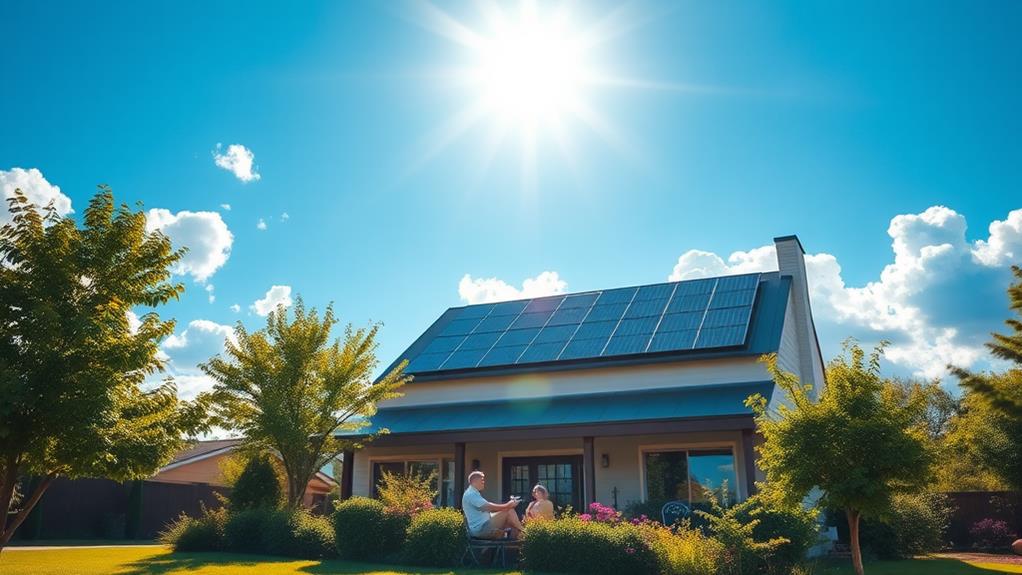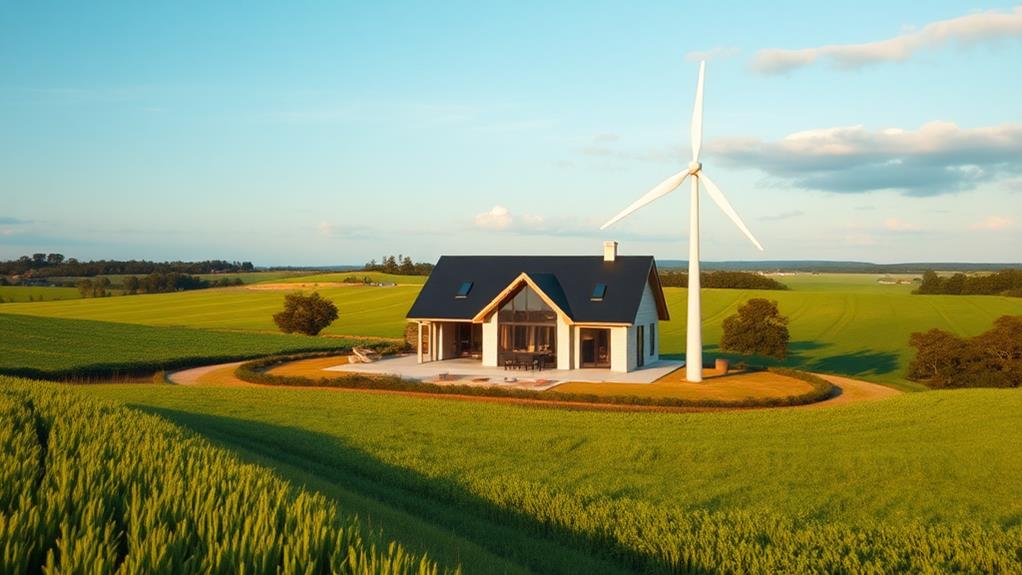When considering the best biomass options for homes, we find that wood pellet boilers are highly efficient, often exceeding 80% efficiency, and utilize automated feeding systems for convenience. Wood chip boilers serve as a cost-effective alternative, especially beneficial for larger properties, offering lower fuel costs at approximately 2.9 pence per kWh. Log-fed boilers, which require significant space and proper fuel drying, can achieve efficiency over 90% with regular maintenance. Additionally, evaluating available storage solutions for these biomass fuels, such as manufactured bins or custom-built options, is essential for peak performance. There's much more to explore regarding efficiency, installation, and environmental benefits.
Key Takeaways
- Wood Pellet Boilers: Highly efficient with rates over 80%, automated feeding reduces manual handling, making them ideal for residential heating.
- Log-Fed Boilers: Achieve efficiencies over 90% with proper maintenance; require approximately seven tons of logs annually for optimal performance.
- Wood Chip Boilers: Cost-effective for larger properties, these systems offer lower fuel costs per kilowatt hour compared to other biomass options.
- Storage Solutions: Consider options like manufactured bins or custom-built storage to efficiently manage biomass fuel supply and optimize space.
- Government Incentives: Take advantage of schemes like the Boiler Upgrade Scheme, which can provide significant financial support for biomass installations.
Overview of Biomass Heating
In recent years, we've seen a growing interest in biomass heating as a viable option for residential energy needs. Biomass heating systems utilize organic materials, primarily wood, to generate heat, offering a sustainable and renewable energy source. Modern devices achieve efficiency rates of 80-90%, comparable to traditional oil and gas systems, making them highly effective for our heating needs. Utilizing biomass fuels, such as wood pellets, chips, logs, and agricultural residues, can greatly reduce greenhouse gas emissions, contributing to a carbon-neutral solution when sourced sustainably. However, homeowners need to evaluate their specific heating needs, the available space for installation and fuel storage, as well as the local availability of different types of biomass fuels to guarantee ideal performance and cost-effectiveness.
Types of Biomass Fuels

Exploring the various types of biomass fuels available for home heating reveals several options tailored to different needs and preferences. For instance, wood pellets, though priced at around 4.2p/kWh, are highly efficient and made from compressed waste materials, requiring careful storage due to their flammability. Alternatively, wood chips are a cost-effective choice at approximately 2.9p/kWh, suitable for medium to large automated boilers, yet necessitate open storage due to their high moisture content. Logs, typically costing about £150 per tonne, demand ample storage and a drying period of a year for peak performance. Additionally, agricultural residues like straw and corn stalks offer sustainable heating solutions, while Elephant Grass provides a low-maintenance option, thriving in low-grade lands.
Benefits of Biomass Energy

As we explore the benefits of biomass energy, it's important to recognize that biomass serves as a renewable energy source that markedly contributes to carbon neutrality, making it a sustainable alternative to fossil fuels. By utilizing biomass heating systems, we not only reduce our carbon footprint but also capitalize on efficient heating solutions that can achieve efficiency rates exceeding 80%. In addition, adopting such systems can lead to economic advantages, thanks to potential government incentives that enhance the financial viability of investing in biomass for our homes.
Renewable Energy Source
Biomass energy stands out as a promising renewable energy source that taps into organic materials like wood and agricultural waste to generate heat. As we explore this option, we can appreciate several key benefits:
- Sustainability: Biomass utilizes resources that might otherwise contribute to waste, supporting environmental sustainability while providing reliable heating and hot water.
- Carbon-Neutral: The combustion of biomass is considered carbon-neutral, as the carbon dioxide released during burning equals the amount absorbed by the plants during their growth cycle.
- Efficiency: Modern biomass boilers, including wood boilers, achieve performance rates of 80-90%, ensuring effective heating while reducing greenhouse gas emissions.
Carbon Neutral Heating
One of the most notable advantages of carbon-neutral heating is its ability to utilize renewable resources while minimizing environmental impact. By employing biomass boilers, we can greatly reduce carbon dioxide emissions, as the combustion of wood pellets, for instance, releases only the carbon absorbed during the plants' growth. This process not only curtails our reliance on fossil fuels but also enhances energy performance, achieving efficiency rates of 80-90%. In addition, government initiatives like the Renewable Heat Incentive (RHI) support homeowners making the switch to these sustainable solutions. Additionally, utilizing waste materials from wood manufacturing in biomass systems promotes waste reduction, making our heating practices more sustainable. Together, we can embrace a greener future through responsible energy choices.
Efficiency of Biomass Systems

When we assess the efficiency of biomass systems, it's vital to compare their ratings with traditional heating methods, as biomass boilers can achieve efficiency rates between 80-90%, making them a viable alternative. It's also important to recognize that factors such as fuel type, moisture content, and system design greatly influence these efficiency levels, and regular maintenance is essential for optimizing performance. By understanding these aspects, we can guarantee that our biomass heating solutions operate at their best, providing both cost savings and environmental benefits.
Efficiency Ratings Comparison
Evaluating the efficiency ratings of various biomass systems reveals significant differences that can impact our heating choices. Understanding these ratings helps us make informed decisions about home heating options. Here's a quick comparison of efficiency ratings:
- Wood Pellet Biomass Boilers: Generally achieve efficiency ratings exceeding 80%, thanks to their uniform size and automated feeding systems.
- Logs in Log-Fed Biomass Boilers: Can reach over 90% efficiency when well-dried and properly maintained, making them an excellent choice for efficient heating.
- Wood Chip Boilers: Considered cost-effective and efficient for larger properties, though their efficiency varies based on the quality of the chips used.
Maintenance Requirements Overview
Maintaining efficiency in biomass systems is essential for ensuring they perform at their best over time. Regular maintenance, including annual servicing, is vital for achieving peak performance and longevity. This typically involves tasks such as ash removal and ensuring system cleanliness, which directly influence the efficiency of biomass boilers. Systems that receive diligent maintenance can achieve efficiency rates between 80-90%, comparable to traditional oil and gas systems. Furthermore, high-quality biomass boilers can last several decades with proper care, ensuring long-term reliability. Utilizing larger thermal stores enhances efficiency by prolonging heating periods, even after fuel is depleted, and reduces the frequency of fuel replenishment. By prioritizing maintenance, we can maximize the benefits of our biomass systems and contribute to sustainable living.
Residential Boiler Options

Choosing the right residential biomass boiler can greatly impact our home's heating efficiency and environmental footprint. When considering various boiler systems, we should evaluate three primary options:
- Wood Pellet Biomass Boilers: Known for high efficiency rates exceeding 80%, these systems come with automated feeding, reducing manual handling.
- Log-Fed Biomass Boilers: Requiring about seven tons of logs annually, they achieve over 90% efficiency, ideal for those with abundant space.
- Wood Chip Biomass Boilers: These are the most cost-effective, offering lower fuel costs per kilowatt hour, making them suitable for larger properties.
We must also remember that proper installation requires dedicated space for both the boiler and adequate fuel storage, often needing an area roughly the size of a single garage.
Fuel Feeding Solutions

Efficient fuel feeding solutions are fundamental for maximizing the performance of our residential biomass boilers. Automatic feeding systems play an essential role, ensuring a consistent fuel supply without manual intervention. When considering options, it's critical to assess the available space to store fuel. Homeowners can select between small manufactured bins for bag feeding or larger cloth bags for bulk storage. Additionally, custom-built storage solutions can be tailored to fit specific needs, optimizing functionality. We can also leverage consultation services to determine the best feeding system that aligns with our heating demands and installation conditions.
| Storage Type | Size Options | Benefits |
|---|---|---|
| Manufactured Bins | Small to Medium | Easy to manage and refill |
| Cloth Bags | Large | Cost-effective for bulk use |
| Custom-Built Storage | Tailored | Fits unique spaces perfectly |
Cost Considerations

When investing in biomass heating systems, understanding the cost implications is essential for making an informed decision. The initial costs typically start at around £25,000, depending on factors like boiler type and automation level. To evaluate the overall expense, we should consider:
- Fuel costs: Wood pellets are competitively priced at approximately 7.5 pence per kWh, while wood chips are cheaper at about 2.9 pence per kWh.
- Government incentives: The Boiler Upgrade Scheme offers limited support, providing up to £5,000, which can offset installation expenses.
- Self-supplied timber: Homeowners with access to their own timber may considerably reduce running costs, enhancing long-term savings compared to traditional fossil fuel systems.
Maintenance and Support

Maintaining a biomass heating system is essential for ensuring its longevity and efficiency. Regular maintenance of biomass boilers, typically conducted annually, includes vital tasks such as ash removal and maintaining cleanliness around the boiler to achieve ideal performance. High-quality biomass boilers, especially from reputable manufacturers like Fröling, offer durability and can last nearly indefinitely with proper care. Modern control panels simplify monitoring, featuring fault indicators that facilitate prompt identification of maintenance needs. Additionally, larger thermal stores enhance efficiency by storing excess heat, allowing for extended heating periods even post-fuel depletion. Engaging with expert resources, such as those from Homebuilding & Renovating, provides us with valuable insights and ongoing support for maintenance and operational inquiries, ensuring our systems operate effectively over time.
Frequently Asked Questions
Can Biomass Be Used in Homes?
Absolutely, we can use biomass energy for home heating! It supports sustainable living, enhances energy efficiency, and reduces our environmental impact. Embracing renewable resources like biomass helps us create a more eco-friendly future together.
What Are the Disadvantages of Biomass Boilers?
When we consider biomass boilers, we must acknowledge the initial costs, space considerations, and maintenance requirements. Plus, fuel availability and emission concerns can impact efficiency levels, making it essential to weigh these factors before deciding.
What Is the Best Type of Biomass?
Choosing the best type of biomass is like tending a garden; we thrive when we select the right seeds. Wood pellets, agricultural residues, and energy crops all promote sustainable practices and efficient energy, nurturing our shared future.
Are Biomass Boilers Worth It?
We think biomass boilers are worth it. With high biomass efficiency, potential energy savings, and lower environmental impact, they can offset installation costs and maintenance requirements, especially when using sustainable fuel types like wood pellets.





